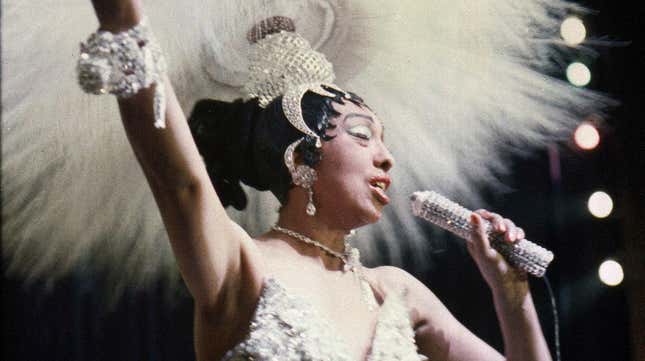
One of the most pioneering Black entertainers in history—and certainly one of its most famous expats—is receiving well-deserved recognition, 46 years after her death. On Tuesday, it was announced that the remains of American-born entertainer-activist Josephine Baker would be reinterred at Paris’s Pantheon monument, making her the first Black woman to be granted the country’s greatest honor.
“Born American and having chosen France, through her engagements and battles, Joséphine Baker carried the motto of the French Republic high. On November 30, 2021, she will enter the Pantheon,” read a translated tweet from French President Emmanuel Macron, who approved the honor “after a campaign led by her family and a petition with about 38,000 signatures,” reports the BBC.

Élysée Palace, the official residence of the President of the French Republic, issued a further statement on the “Pantheonization” of Baker, writing (translated):
Through this destiny, France distinguishes an exceptional personality, born American, having chosen, in the name of the fight she led all her life for freedom and emancipation, the eternal France of the Universal Enlightenment.
World-renowned music hall artist, committed to the Resistance, tireless anti-racist activist, she was involved in all the fights that bring together citizens of goodwill, in France and around the world.
For all these reasons, because she is the embodiment of the French spirit, Joséphine Baker, who died in 1975, today deserves the recognition of the motherland.
Of course, Baker’s original motherland was America, where she was born Freda Josephine McDonald in St. Louis, Mo. on June 3, 1906. Starting her life in poverty, in adolescence Baker became a street performer, eventually making her way to the vaudeville circuit and adopting the surname of her second husband, Willie Baker, at age 15.
Venturing to New York City during the height of the Harlem Renaissance, Baker was in the chorus lines of the all-Black Broadway revues Shuffle Along and The Chocolate Dandies, becoming a standout for her her dancing and comedic timing. La Revue Nègre brought Baker to Paris in 1925, where she became a headliner at the Folies Bergère and famous for her semi-nude “Danse Sauvage” (widely recognized as the “banana skirt dance”). In 1927, Baker’s became the first Black woman to star in a major motion picture, Siren of the Tropics.
A return to America proved less successful, as Baker agreed to star in a Broadway revival of the Ziegfeld Follies only to be lambasted by the press (Time magazine reportedly called her a “Negro wench” in its review). Returning to France, she relinquished her American citizenship.
World War II brought a new dimension to Baker’s career, as she was recruited by French military intelligence to use her fame and access to the European elite to gather crucial information against the Nazis, while also entertaining the Allied troops. For her efforts, she was awarded multiple military decorations, as well as receiving the highest French order of merit, the Chevalier of the Légion d’honneur, by General Charles de Gaulle.
Baker’s heroism didn’t end there; performing in the States in the early ‘50s, she insisted on desegregating her audiences, publicly called out the racial discrimination she experienced at venues and hotels, and was honored as the NAACP’s “Woman of the Year” in 1951. Baker was also the only official female speaker at the 1963 March on Washington, where she used the platform to recognize the “Negro Women for Civil Rights.”
A mother of 12 internationally adopted children, Baker’s status as a WWII hero and international icon unfortunately did not prevent her from falling into irreparable debt, losing her estate in 1968. Offered a home in the French Riviera city-state of Monaco by Princess Grace, Baker returned to the stage to support herself, culminating in a retrospective revue of her career which premiered on April 8, 1975 at the Bobino in Paris. Four days into the run, she suffered a cerebral hemorrhage, dying on April 12 at age 68. Buried in Monaco, upon her death, Baker was the only American-born woman to receive full French military honors at her funeral.
Baker was intended to become only the sixth woman to be interred at the Pantheon, joining the likes of Marie Curie. However, Baker’s adopted son and biographer Jean-Claude Bouillon-Baker clarified to international news agency Agence France-Presse that her body will remain in Monaco (h/t BBC). Instead, he says his mother will be honored via a memorial with a plaque at the Pantheon.

